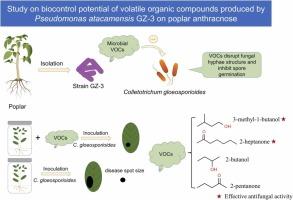atacampseudomonas atacamensis GZ-3挥发性有机物对杨树炭疽病的生物防治潜力研究
IF 5.6
1区 农林科学
Q1 AGRICULTURAL ENGINEERING
引用次数: 0
摘要
由炭疽菌(Colletotrichum gloeosporioides)引起的杨树炭疽病是世界范围内主要的森林病害之一,每年给林业生产造成不可估量的损失。本研究从加拿大杨叶中分离到一株对gloeosporioides具有显著拮抗活性的内生细菌,并将其鉴定为假单胞菌atacamensis GZ-3。采用全基因组测序分析菌株GZ-3的特异性生物学功能。菌株GZ-3产生的挥发性有机物(VOCs)对gloeosporioides具有良好的抑菌活性。这些挥发性有机化合物能有效抑制黄孢霉菌丝生长和分生孢子萌发。此外,代谢组学分析显示,挥发性有机化合物(VOCs)通过诱导黄酮类化合物的合成,帮助杨树抵抗黄孢子虫的侵染。3-甲基-1-丁醇和2-庚酮是VOCs中主要的抗真菌化合物。因此,阿塔卡曼假单胞菌GZ-3具有良好的生物防治潜力。本研究为杨树炭疽病的生物防治提供了新的策略。本文章由计算机程序翻译,如有差异,请以英文原文为准。

Study on biocontrol potential of volatile organic compounds produced by Pseudomonas atacamensis GZ-3 on poplar anthracnose
Poplar anthracnose caused by Colletotrichum gloeosporioides is one of the major forest diseases worldwide, causing incalculable losses in forestry production every year. In this study, an endophytic bacterium with significant antagonistic activity against C. gloeosporioides was isolated from Populus canadensis leaves, identified and named Pseudomonas atacamensis GZ-3. The specific biological functions of strain GZ-3 were analyzed using whole genome sequencing. The volatile organic compounds (VOCs) produced by strain GZ-3 had good antifungal activity against C. gloeosporioides. These VOCs could effectively inhibit mycelial growth and conidial germination of C. gloeosporioides. In addition, metabolomics analysis revealed that VOCs could help poplar resist infection of C. gloeosporioides by inducing the synthesis of flavonoids in poplar. 3-methyl-1-butanol and 2-heptanone were the main antifungal compounds in VOCs. Therefore, Pseudomonas atacamensis GZ-3 had good potential for biocontrol. This study provided a new strategy for the biological control of poplar anthracnose.
求助全文
通过发布文献求助,成功后即可免费获取论文全文。
去求助
来源期刊

Industrial Crops and Products
农林科学-农业工程
CiteScore
9.50
自引率
8.50%
发文量
1518
审稿时长
43 days
期刊介绍:
Industrial Crops and Products is an International Journal publishing academic and industrial research on industrial (defined as non-food/non-feed) crops and products. Papers concern both crop-oriented and bio-based materials from crops-oriented research, and should be of interest to an international audience, hypothesis driven, and where comparisons are made statistics performed.
 求助内容:
求助内容: 应助结果提醒方式:
应助结果提醒方式:


